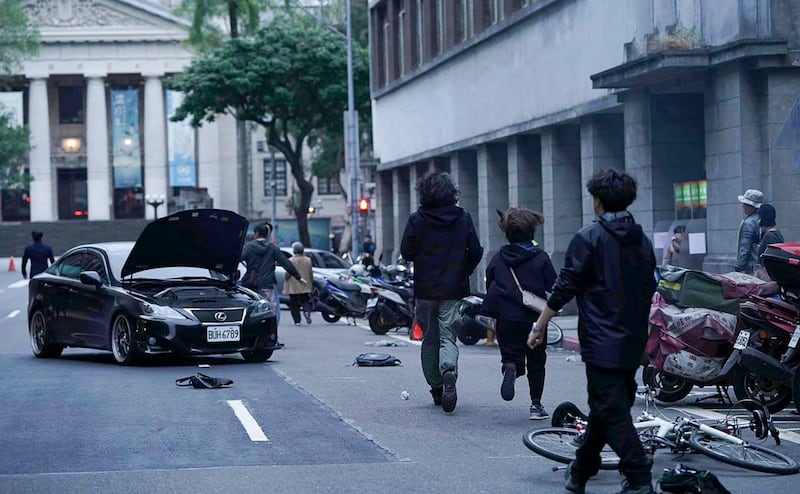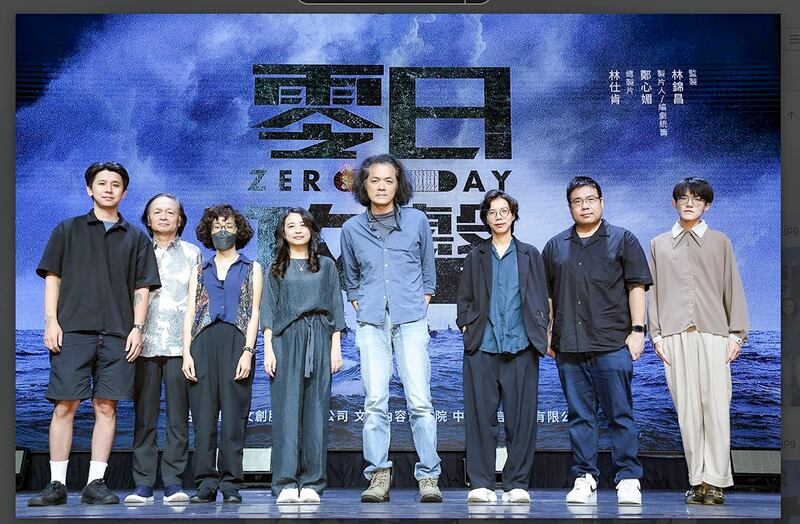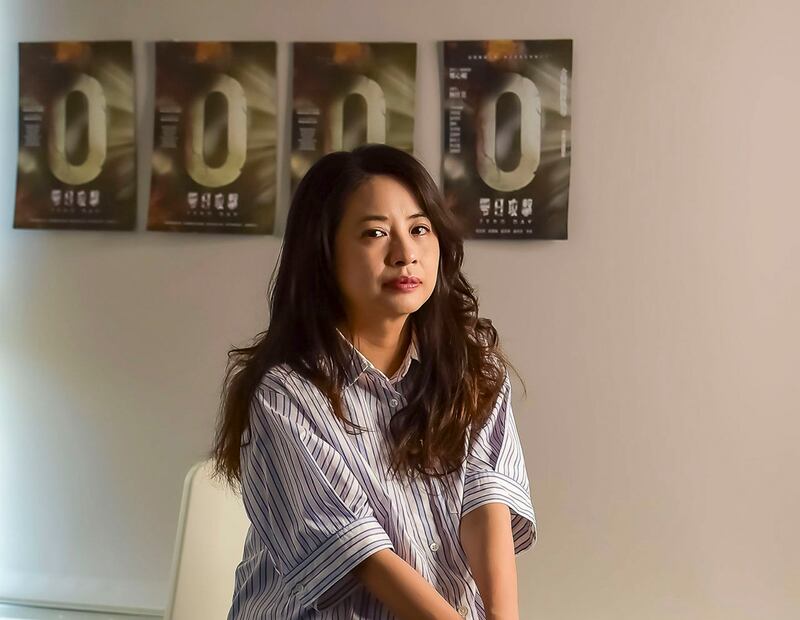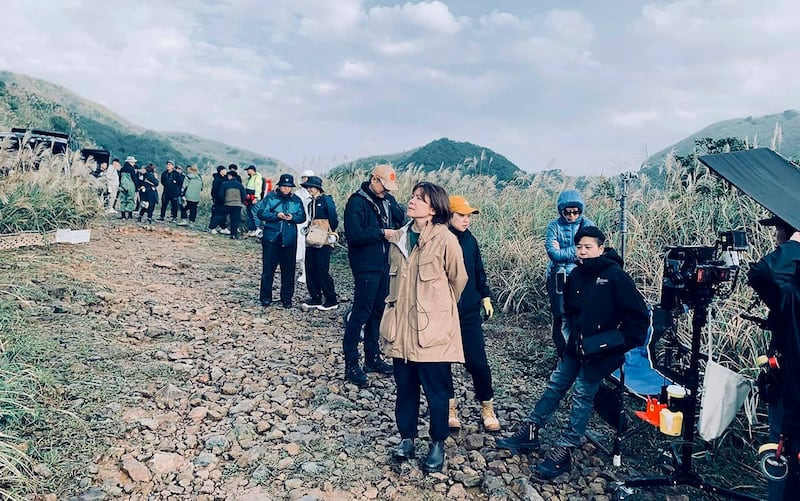The producers of a Taiwanese TV show portraying the "worst-case scenario" of a Chinese invasion have hit back at political criticism, saying the show has no links to the Taiwanese government or ruling party, and that it merely forces people to talk about what everyone is avoiding -- the fear of war.
The 17-minute trailer for "Zero Day" has sparked intense reactions in democratic Taiwan, with a prominent opposition politician accusing the ruling Democratic Progressive Party of funding the show to fuel a sense of threat ahead of the 2026 local elections.
Former opposition Kuomintang presidential hopeful Jaw Shau-kong hit out at the show soon after its official trailer was released in late July, garnering more than 2 million views across different platforms.
He pointed to a government subsidy for the show from the Ministry of Culture, accusing the ruling Democratic Progressive Party of funding "cognitive warfare" to shore up its national security platform at the next election.

Yet showrunners say the show is simply a speculative dramatization of an event that many fear could take place in the near future -- a Chinese invasion.
Producer and screenwriter Cheng Hsin-mei told RFA Mandarin in a recent interview that none of the show's creators have ties to the ruling Democratic Progressive Party or to the current administration.
Instead, show-runners consulted with military experts and Puma Shen, a specialist in information warfare who later went on to become a DPP member of the democratic island's Legislative Yuan, she said.
Bank run and social unrest
In the official trailer released July 23, Chinese helicopters overfly the presidential palace in Taipei as China's People's Liberation Army blockades Taiwan on the pretext of a search and rescue operation for a downed aircraft.
Reports emerge on social media of a Chinese landing on Taiwan's Kinmen island, amid rumors that the democratically elected president has left town, as some journalists hesitate to call the invasion what it is.
Social media influencers spread the idea that the island is unable to defend itself, and had better sign a peace agreement with China as soon as possible.
The next day, there's a run on the banks, sparking social unrest as foreign nationals evacuate and hackers disrupt internet access along with critical power and water supplies. Pro-Beijing activists take to the streets to call for surrender and "unification" with China.
It's a gradually evolving nightmare scenario likened by one character to "a zombie movie" that sees the foundations of Taiwan's democracy shaken and undermined in just a few days.
The scenes have sparked intense debate in Taiwan, where a nascent civil defense movement is beginning to take root.

"Some people said that after watching it, horror movies didn't seem scary any more," Cheng said. "Some people said they wanted to protect Taiwan, while others said it was overly exaggerated, and defeatist."
"The show addresses that dark shadow of war that looms in the minds of the Taiwanese people," she said. "No one can deny that Taiwan is a place where war is likely to break out, nor that a war would destroy the familiar lifestyle Taiwanese people enjoy. This should be the consensus of all Taiwanese people."
"It is war, not this script, that will shake the foundations of our country and destroy Taiwan."
‘Human nature in wartime’
Cheng started work on the storyline in the second half of 2022, just months after Russia's invasion of Ukraine met with stronger-than-expected military resistance.
"I've always felt that the most important thing we don't talk about, and we should talk about, is the fear of war," Cheng said. "Taiwan has faced threats from across the Strait since 1949, and the topic has become more urgent with the outbreak of the Russia-Ukraine war."
The show will offer 10 episodes by 10 different directors with plotlines showing the different paths taken by characters as their once-comfortable world is changed forever. The episodes portray political intrigue, media infiltration, internet celebrities and AI deep fakes, with nods to the supernatural, horror, comedy and other genres.

But overall, the show tries not to take a particular point of view, according to Cheng.
"The point isn't to promote resistance or surrender," Cheng said. "It's to focus on human nature in wartime."
She is personally skeptical that all of the island's 23 million residents would follow the call to arms in the event of an invasion by Chinese forces.
"Most people will make the choice that's in their best interests and those of their loved ones," she said. "Most people's first instinct will be to leave."
"But when you think about it, it's also not that simple. Can an entire family and their friends all leave together? Will they have to give up their entire way of life forever?"
Take a moment to read more
[ Taiwanese TV series explores possible invasion from ChinaOpens in new window ]
[ Indigenous activist prepares Taiwanese communities for Chinese invasionOpens in new window ]
[ Taiwan, China ‘smoothly’ wind up talks on fishermen killed off KinmenOpens in new window ]
[ China coast guard seizes Taiwan fishing boat near KinmenOpens in new window ]
[ China trying to ‘normalize’ incursions in Taiwan Strait, Taipei saysOpens in new window ]
[ Taiwan’s Kinmen Island: On the front lines of tension with ChinaOpens in new window ]
Realistic depictions
Cheng added: "This drama is actually about opposing war, alerting people to the horror of war, so as to prevent it."
Cheng cited recent media reports claiming that Taiwanese are indifferent to frequent military incursions by China in recent years, adding: "Some foreign journalists ... are finding that the Taiwanese are just feigning indifference, and avoiding talking about it out of a sense of helplessness, the feeling that if they really did attack, there would be nothing they could do about it."
The show is based on predictions from analysts that the most likely time for China to invade would be during the transition between presidents, in the four-month window between late January elections and the new president's inauguration in May.
Lo Ging-zim, who made the 17-minute trailer and who directs one of Zero Day's episodes, is a former director of Chinese TV commercials who shot a campaign documentary about ruling Democratic Progressive Party President Lai Ching-te and his running mate Hsiao Bi-khim.

He said the show has tried to keep its depictions as realistic as possible, and show how Chinese infiltration today could tip the balance in a future invasion, by preparing a "fifth column" of agents and supporters of the Chinese state.
"It's not about sensationalism," Lo said. "Removing those factors will give us a chance to see China's red infiltration and gray-zone warfare against Taiwan -- something everyone really needs to understand and help with."
"It's quite similar to a military exercise, where you have to imagine the worst-case scenarios," he said, adding that if the show shocks people into being more vigilant, it will have been worth it.
Translated by Luisetta Mudie.
